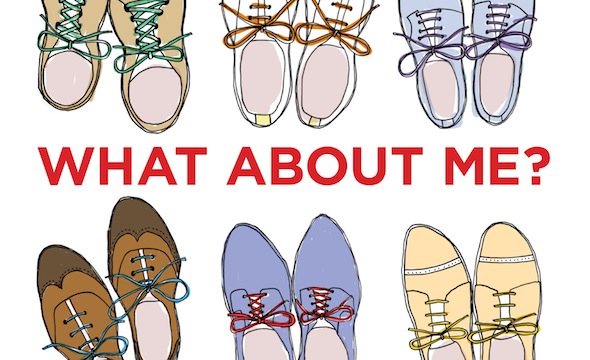Truthdigger of the Week: Paul Verhaeghe
The Belgian psychotherapist's new book considers the impact of 30 years of neoliberal economics on the development of personal identity and cultural character in the West.
Can economic policy shape our personalities? Can it make individuals and entire populations antisocial by character?
A new book by Belgian psychotherapist Paul Verhaeghe argues yes. “What About Me? The Struggle for Identity in a Market-Based Society,” out from Scribe Publications in August, considers the impact of 30 years of privatization, deregulation and so-called free market economics on the development of personal identity and cultural character in the West, beginning with the idea of success as it is narrowly and monolithically defined according to the culture of business.
A sample of Verhaeghe’s thinking appeared in The Guardian on Sept. 29. In an article titled “Neoliberalism has brought out the worst in us,” Verhaeghe writes that decades of research and therapeutic practice have led him to the conclusion that “meritocratic neoliberalism favors certain personality traits and penalizes others.” There is another way to put this. Just as environments, according to Darwin’s theory of natural selection, select for the survival of organisms that possess advantageous traits, so do economies select for certain traits and reject others. In other words, economies reward and preserve certain kinds of people and make survival difficult for others.
These propositions raise the questions: What kind of person does the current neoliberal order favor? What attributes do the majority of “successful” people possess?
“The first is articulateness, the aim being to win over as many people as possible,” Verhaeghe writes. And one doesn’t need to excel at intimacy or reach for depth in relationships, given that most interaction between people today is superficial. Another is the ability to inspire confidence in hiring managers and potential customers, regardless of whether any confidence is merited. In other words, one must be able to “lie convincingly and feel little guilt,” just like a con-man. Other characteristics include flexibility and impulsiveness, which can lead to risky behavior.
These attributes, which Verhaeghe admits take the matter to extremes, nonetheless tick off boxes numbered on the psychopathy checklist designed by Robert Hare, the best-known living specialist on the condition. He defends their relevance by pointing out that in the marketplace, “Solidarity becomes an expensive luxury and makes way for temporary alliances, the main preoccupation always being to extract more profit from the situation than your competition.” Among individuals, “Social ties with colleagues weaken, as does emotional commitment to the enterprise or organisation.” Bullying too has become a common feature of the workplace, he says, with a long-established “buried sense of fear” in workers “ranging from performance anxiety to a broader social fear of the threatening order” only getting worse. And an extreme emphasis on supervision infantilizes workers, stripping employees of the chance to develop the ability to think independently by failing to treat them as adults.
One consequence of these trends is “serious damage to people’s self-respect.” If such respect depends in large part on the recognition that people receive from others, then a growing group of people — who, as employees, are unneeded by anyone — will tend to develop low self-respect. The situation for individuals gets only worse as they are told by advertisements and corporate sloganeers that they could become successes if only they tried hard enough.
“An increasing number of people fail, feeling humiliated, guilty and ashamed,” Verhaeghe writes. “We are forever told that we are freer to choose the course of our lives than ever before, but the freedom to choose outside the success narrative is limited. Furthermore, those who fail are deemed to be losers or scroungers, taking advantage of our social security system. A neoliberal meritocracy would have us believe that success depends on individual effort and talents, meaning responsibility lies entirely with the individual and authorities should give people as much freedom as possible to achieve this goal. For those who believe in the fairytale of unrestricted choice, self-government and self-management are the pre-eminent political messages, especially if they appear to promise freedom.
“Along with the idea of the perfectible individual,” he adds, “the freedom we perceive ourselves as having in the west is the greatest untruth of this day and age.”
Verhaeghe points out that the freedom Americans tend to presume is theirs is of a very particular type. It is the freedom to be successful. But successful at what? To learn to play Bach’s Cello Suites? To develop a poetic voice? To become a more sensitive and responsive parent or friend? There is a wide range of possible human activity — the majority of it, in fact — that does not serve the purposes of the market. When decisive power over the shape and direction of society is given to the marketplace, the experiences and pleasures available to people are restricted. This goes for the development of personalities as well. Freedom and variety for the whole population are not this scheme’s grand result.
Of course they may have never been intended to be. Economies do not spring from thin air. From the moment that follows the first exchange of goods, services or whatever else, they are shaped deliberately by those who accumulate and then possess power. Neoliberalism, which is Verhaeghe’s primary target, is a very particular set of rules for organizing an economy. Its salutary effects for a vanishingly small part of the world population are well understood, and because of this it is preserved. Verhaeghe delivers the bad news that by the standards of healthy societies established by centuries of thinkers on the topic, neoliberalism is making the lot of us worse. But a sound diagnosis is a first step toward a viable cure. For getting us halfway there, we honor Paul Verhaeghe as our Truthdigger of the Week.
Your support is crucial…With an uncertain future and a new administration casting doubt on press freedoms, the danger is clear: The truth is at risk.
Now is the time to give. Your tax-deductible support allows us to dig deeper, delivering fearless investigative reporting and analysis that exposes what’s really happening — without compromise.
Stand with our courageous journalists. Donate today to protect a free press, uphold democracy and unearth untold stories.









You need to be a supporter to comment.
There are currently no responses to this article.
Be the first to respond.